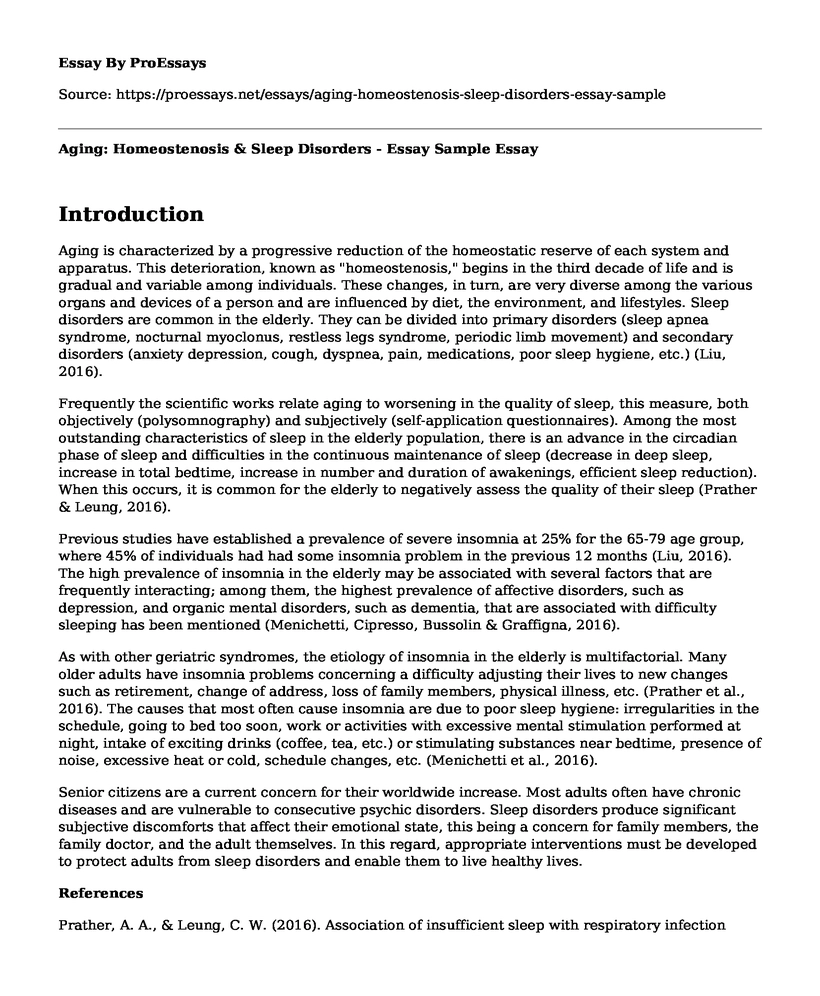Introduction
Aging is characterized by a progressive reduction of the homeostatic reserve of each system and apparatus. This deterioration, known as "homeostenosis," begins in the third decade of life and is gradual and variable among individuals. These changes, in turn, are very diverse among the various organs and devices of a person and are influenced by diet, the environment, and lifestyles. Sleep disorders are common in the elderly. They can be divided into primary disorders (sleep apnea syndrome, nocturnal myoclonus, restless legs syndrome, periodic limb movement) and secondary disorders (anxiety depression, cough, dyspnea, pain, medications, poor sleep hygiene, etc.) (Liu, 2016).
Frequently the scientific works relate aging to worsening in the quality of sleep, this measure, both objectively (polysomnography) and subjectively (self-application questionnaires). Among the most outstanding characteristics of sleep in the elderly population, there is an advance in the circadian phase of sleep and difficulties in the continuous maintenance of sleep (decrease in deep sleep, increase in total bedtime, increase in number and duration of awakenings, efficient sleep reduction). When this occurs, it is common for the elderly to negatively assess the quality of their sleep (Prather & Leung, 2016).
Previous studies have established a prevalence of severe insomnia at 25% for the 65-79 age group, where 45% of individuals had had some insomnia problem in the previous 12 months (Liu, 2016). The high prevalence of insomnia in the elderly may be associated with several factors that are frequently interacting; among them, the highest prevalence of affective disorders, such as depression, and organic mental disorders, such as dementia, that are associated with difficulty sleeping has been mentioned (Menichetti, Cipresso, Bussolin & Graffigna, 2016).
As with other geriatric syndromes, the etiology of insomnia in the elderly is multifactorial. Many older adults have insomnia problems concerning a difficulty adjusting their lives to new changes such as retirement, change of address, loss of family members, physical illness, etc. (Prather et al., 2016). The causes that most often cause insomnia are due to poor sleep hygiene: irregularities in the schedule, going to bed too soon, work or activities with excessive mental stimulation performed at night, intake of exciting drinks (coffee, tea, etc.) or stimulating substances near bedtime, presence of noise, excessive heat or cold, schedule changes, etc. (Menichetti et al., 2016).
Senior citizens are a current concern for their worldwide increase. Most adults often have chronic diseases and are vulnerable to consecutive psychic disorders. Sleep disorders produce significant subjective discomforts that affect their emotional state, this being a concern for family members, the family doctor, and the adult themselves. In this regard, appropriate interventions must be developed to protect adults from sleep disorders and enable them to live healthy lives.
References
Prather, A. A., & Leung, C. W. (2016). Association of insufficient sleep with respiratory infection among adults in the United States. JAMA internal medicine, 176(6), 850-852. Retrieved from doi:10.1001/jamainternmed.2016.0784
Liu, Y. (2016). Prevalence of healthy sleep duration among adults-United States, 2014. MMWR. Morbidity and mortality weekly report, 65. Retrieved from DOI: http://dx.doi.org/10.15585/mmwr.mm6506a1external icon
Menichetti, J., Cipresso, P., Bussolin, D., & Graffigna, G. (2016). Engaging older people in healthy and active lifestyles: a systematic review. Ageing & Society, 36(10), 2036-2060.
Cite this page
Aging: Homeostenosis & Sleep Disorders - Essay Sample. (2023, Mar 04). Retrieved from https://proessays.net/essays/aging-homeostenosis-sleep-disorders-essay-sample
If you are the original author of this essay and no longer wish to have it published on the ProEssays website, please click below to request its removal:
- Oppositional Defiant Disorder Trauma in Foster Children
- Role of Care Homes Essay Example
- Nursing Leadership and Management on Nursing Shortages and Turnover Essay
- Geriatric Nutrition for Heart Disease - Essay Sample
- Emergency and Standby Power Supplies for Buildings Paper Example
- Essay Example on Romeo and Juliet: Love Is a Chaotic Force of Nature
- Paper Example on Physical Therapy: An Important Well-Being Occupation







